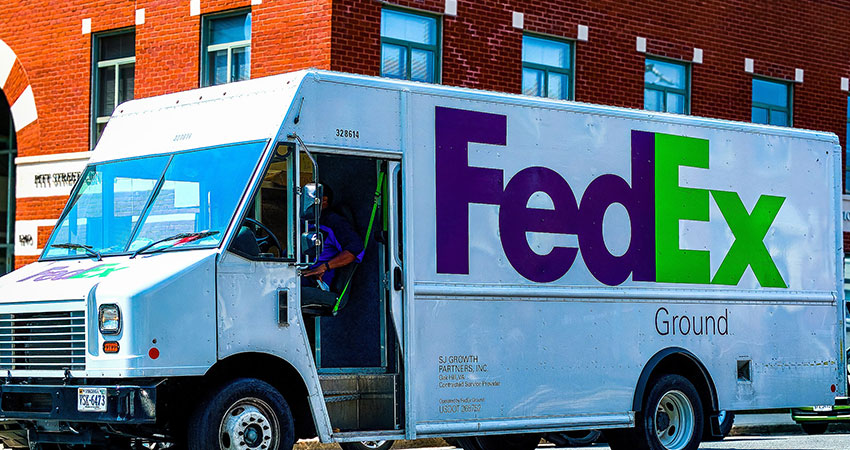FedEx Ground told its base of 6,000 contractors that domestic peak season volume is expected to be lighter than previously reported, as the company battles headwinds a year after package flow fell below forecasts, causing pain and outcries from contractors who invested heavily in trucks and drivers.
This also comes after significantly lower volumes worldwide adversely affected FedEx’s latest quarterly report, which the company pre-reported a week before earnings, while also announcing a historically high general rate increase (GRI). FedEx has also withdrawn its FY 2022 outlook, while rival UPS has held firm.
In an Oct. 5 memo to contractors, Paul Melander, senior vice president of safety and transportation for FedEx Ground, said the initial downward projections were expected around Oct. 21, with more to follow as the season progresses “as warranted.” He said the carrier is working to get a better handle on projections from shippers “in this fluid and changing economic environment.”
“These changes will reflect the latest information from customers about how they anticipate current conditions are likely to decrease their volumes this holiday season,” Melander said.
Meredith Miller, a manager of external communications for FedEx Ground, said the updated forecast will enable contractors to ensure appropriate peak resources are in place while minimizing costs.
“We continue to collaborate with customers on their projected shipping needs and will make adjustments as necessary to ensure our network and service provider businesses are prepared to deliver outstanding peak service,” Miller said.
Reuters reported that half of the 20 FedEx Ground contractors its spoke with said they had not been planning to invest in vehicles and seasonal help based on the company’s original holiday forecast, after getting burned the year before. Instead, they were looking to shore up sagging profits hit by fuel costs and money-losing Sunday deliveries, while complaining of unachievable bonus thresholds.
Reuters also reported that contractors are unhappy with a new program that could cost them up to 3% of their revenue to offset accident liability costs. This was one of several issues raised by Spencer Patton, a former Ground contractor based in Nashville who founded the Trade Association for Logistics Professionals (TALP).
“They (FedEx) expect businesses to have no accidents for a 36-month period — that’s an incredibly impossible standard to achieve,” Patton said in August. “On top of that, FedEx sets penalties to be 50% higher than the incentives they’re offering. Schedule L is another burden being put on major contractors who stand to lose 1% to 3% of revenue.”
FedEx management has thus far refused to directly engage with TALP, saying they were in danger of breach of contract. Patton’s contract was terminated in August after he began a vocal media campaign to address contractor’s economic grievances. At the same time, FedEx filed a lawsuit against Patton, claiming he concocted a “fictionalized crisis” to benefit his various business concerns, including a consultancy for FedEx and Amazon contractors.
Daniel Foster, a former FedEx Ground contractor in Oak Park, MI, sold his four routes in September after 22 years in business, based on what he called “disgraceful contracts” with its partner businesses. He said his volume decreased from 3,000 daily stops in 2020 to 1,200 when he sold the business.
“I always told FedEx that I run with what I have and we always make it and never failed,” he said. “But last year was terrible for so many. I honestly don’t know what they need to do to fix all there issues. There are so many, starting with contractors coming in blind every morning because (Dynamic Route Optimization, the system used to share volumes and plan routes for the next day) is off every night.”
Foster also said that his terminal management would change the coding on undelivered packages to “contractor DNA (did not attempt),” negatively impacting his service levels.
“I asked over and over again why they are doing it and the same answer always was, ‘we’ll look into it,’ ” he said. “FedEx was finding packages in the terminal on different belt lines than the one they should be on after they dispatch, and coding them DNA so it hits the contractor’s service.”
Nate Costa, a FedEx ground contractor in St. Louis, said he was surprised by the announced lower volumes, as his terminal manager had asked him to staff up and acquire more trucks for peak two months ago. He said he’s now trying to sell nine of his 32 trucks “because we don’t expect much volume.”
“In order to rectify the situation we need a new Schedule K,” Costa said, referring to the volume-based incentive program from FedEx Ground. “The one we signed was already based off of inflated projections and now we won’t be able to make money with our current one.”
Costa said his business has been losing money since striking a new contract in March, and is being kept afloat by loans to make payroll while he waits for Employee Retention Tax Credit (ERTC) funds. He added other contractors in his terminal are “barely scraping by.”
“If we were not receiving the ERTC money in 2-3 weeks, we would already have filed bankruptcy and been out of business,” Costa said. “We’re waiting for that and hopefully a new contract from FedEx or an end to Sunday delivery.”
Miller said the terms of Schedule K “are unique to each service provider business and are regularly reviewed to determine if adjustments are warranted.”

